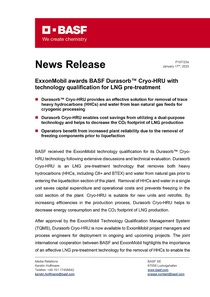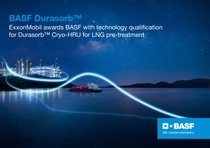Chemical Catalysts and Adsorbents
ExxonMobil awards BASF Durasorb™ Cryo-HRU with technology qualification for LNG pre-treatment
- Durasorb™ Cryo-HRU provides an effective solution for removal of trace heavy hydrocarbons (HHCs) and water from lean natural gas feeds for cryogenic processing
- Durasorb Cryo-HRU enables cost savings from utilizing a dual-purpose technology and helps to decrease the CO2 footprint of LNG production
- Operators benefit from increased plant reliability due to the removal of freezing components prior to liquefaction
BASF received the ExxonMobil technology qualification for its Durasorb™ Cryo-HRU technology following extensive discussions and technical evaluation. Durasorb Cryo-HRU is an LNG pre-treatment technology that removes both heavy hydrocarbons (HHCs, including C8+ and BTEX) and water from natural gas prior to entering the liquefaction section of the plant. Removal of HHCs and water in a single unit saves capital expenditure and operational costs and prevents freezing in the cold section of the plant. Cryo-HRU is suitable for new units and retrofits. By increasing efficiencies in the production process, Durasorb Cryo-HRU helps to decrease energy consumption and the CO2 footprint of LNG production.
After approval by the ExxonMobil Technology Qualification Management System (TQMS), Durasorb Cryo-HRU is now available to ExxonMobil project managers and process engineers for deployment in ongoing and upcoming projects. The joint international cooperation between BASF and ExxonMobil highlights the importance of an effective LNG pre-treatment technology for the removal of HHCs to enable the continuous production of LNG.
“ExxonMobil was pleased to have the opportunity to evaluate BASF Durasorb Cryo-HRU technology as a key component in the LNG production process. After thorough evaluation, we consider the technology qualified for use in our operations. ExxonMobil relies on strong collaborations like that with BASF, as well as rapid adoption of new cost-effective technologies such as Durasorb Cryo-HRU, to sustain our competitive advantage,” said Jeff Weidner, Upstream Technology Portfolio Manager, ExxonMobil Technology and Engineering.
“BASF is proud to have our technology qualified by ExxonMobil and support their efforts to produce LNG more efficiently and sustainably. With our Durasorb portfolio, we offer an integral solution for the LNG industry based on decades of experience from our natural gas experts, and we are well positioned to implement this solution to benefit our customers around the world,” said Detlef Ruff, Senior Vice President, Process Catalysts at BASF.
Read more about BASF’s Durasorb portfolio here.
About BASF’s Catalysts Division
BASF’s Catalysts division is the world’s leading supplier of environmental and process catalysts. The group offers exceptional expertise in the development of technologies that protect the air we breathe, produce the fuels that power our world and ensure efficient production of a wide variety of chemicals, plastics and other products, including advanced battery materials. By leveraging our industry-leading R&D platforms, passion for innovation and deep knowledge of precious and base metals, BASF’s Catalysts division develops unique, proprietary solutions that drive customer success. Further information on BASF’s Catalysts division is available on the Internet at www.catalysts.basf.com.
About BASF
At BASF, we create chemistry for a sustainable future. We combine economic success with environmental protection and social responsibility. The approximately 122,000 employees in the BASF Group work on contributing to the success of our customers in nearly all sectors and almost every country in the world. Our portfolio is organized into six segments: Chemicals, Materials, Industrial Solutions, Surface Technologies, Nutrition & Care and Agricultural Solutions. BASF generated sales of around €63 billion in 2018. BASF shares are traded on the stock exchange in Frankfurt (BAS) and as American Depositary Receipts (BASFY) in the U.S. Further information at www.basf.com.
P-23-107

